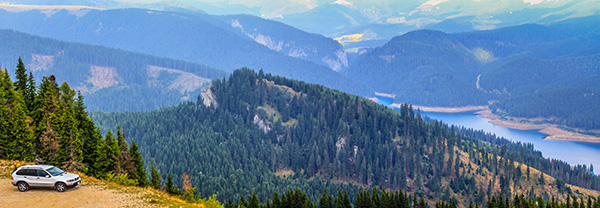
Driving through California’s mountains offers breathtaking views, winding roads, and varying elevations—but it also puts extra demands on your vehicle. Whether you’re heading to Big Bear, Yosemite, or Lake Tahoe, preparing your car for mountain driving is essential to ensure a safe and smooth trip. Steep inclines, sharp turns, and unpredictable weather can challenge both you and your vehicle, so checking key systems before you go can help prevent breakdowns. Here’s what to inspect before setting off on your mountain adventure.
Check Your Tires for Traction and Pressure
Mountain roads require good tire grip, especially if you’ll be driving in colder temperatures or on wet, icy, or gravel roads. Worn-out tread can reduce traction, making it harder to stop on steep declines or navigate sharp curves safely. Use the penny test to check your tread depth—if Lincoln’s head is fully visible when inserted into the tread, your tires may need replacing.
Also, make sure your tires are properly inflated. Underinflated tires can overheat on long drives, while overinflated tires can reduce traction on uneven surfaces. Check the pressure before your trip and adjust it according to your vehicle’s recommended PSI. If you expect snow or ice, consider bringing tire chains (and make sure you know how to install them).
Inspect Your Brakes for Mountain Driving
Brakes work harder in mountainous terrain, especially when descending steep grades. If your brake pads are thin or worn, they may overheat and lose effectiveness, increasing stopping distances and putting you at risk. If you hear squeaking, grinding, or feel vibrations when braking, have your brakes checked before your trip.
Brake fluid is also crucial—it absorbs heat and helps maintain braking power. If your fluid is dark or low, a flush and refill may be necessary to keep your system functioning properly in high-demand conditions.
Test Your Battery to Avoid Unexpected Failures
Cold temperatures at higher elevations can put additional strain on your car battery, and a weak battery may struggle to start in the mountains. If your battery is more than three years old or if you’ve noticed slow starts recently, get it tested before your trip. Look for corrosion on the terminals, and ensure all connections are secure. Carrying jumper cables or a portable battery pack can also save you from being stranded in remote areas.
Ensure Your Cooling System is in Top Shape
Climbing mountain roads can push your engine to work harder, increasing the risk of overheating. Your radiator, coolant levels, and hoses should all be in good condition to handle the extra stress. Check your coolant reservoir to ensure it’s filled to the appropriate level, and inspect for any leaks or cracks in hoses.
If your temperature gauge has been running high or if you haven’t had a coolant flush in a while, consider getting one before your trip. Keeping an extra bottle of coolant in your trunk is also a smart precaution in case of emergencies.
Check Wipers and Lights
Mountain weather can change suddenly, with fog, rain, or even snow appearing unexpectedly. Visibility is key to staying safe, so check your windshield wipers and washer fluid to ensure they’re in good condition. If your wipers leave streaks or make noise, replace them before your trip.
Make sure your headlights, brake lights, and turn signals are all working properly, as mountain roads often have sharp turns, tunnels, and lower visibility at dusk. If driving in fog-prone areas, use fog lights if your vehicle has them, and avoid using high beams in foggy conditions as they can reduce visibility.
Top Off Fluids and Pack Emergency Supplies
Long drives through mountain terrain can strain various vehicle systems, so checking and topping off all essential fluids is important. In addition to coolant and brake fluid, check your engine oil, transmission fluid, and power steering fluid. If any are low or overdue for replacement, service them before your trip.
Packing an emergency kit is also a good idea in case of unexpected delays or vehicle issues. Your kit should include:
- A spare tire, jack, and lug wrench
- Jumper cables or a portable jump starter
- Flashlight and extra batteries
- First aid kit
- Non-perishable snacks and bottled water
- Blanket and warm clothing
- Map or GPS backup in case of limited cell service
Mountain driving puts extra stress on your vehicle. If you’re unsure whether your car is road-trip ready, visit 26th Street Auto Center in Los Angeles, CA, for a professional inspection. Our team will make sure your brakes, tires, battery, and essential systems are in top condition, so you can drive with confidence on your next adventure.